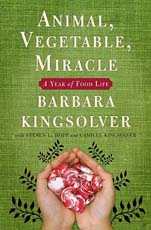"Will our single-family decision to step off the nonsustainable food grid give a big black eye to that petroleum-hungry behemoth? Keep reading, but don't hold your breath. We only knew, when we started, that similar choices made by many families at once were already making a difference: organic growers, farmers' markets, and small exurban food producers now comprise the fastest-growing sector of the U.S. food economy. A lot of people at once are waking up to a troublesome truth about cheap fossil fuels: we are going to run out of them. Our jet-age dependence on petroleum to feed our faces is a limited-time-only proposition. Every food calorie we presently eat has used dozens or even hundreds of fossil-fuel calories in its making: grain milling, for example, which turns corn into the ingredients of packaged foods, costs ten calories for every one food calorie produced. That's before it gets shipped anywhere. By the time my children are my age, that version of dinnertime will surely be an unthinkable extravagance.
"I enjoy denial as much as the next person, but this isn't rocket science: our kids will eventually have to make food differently. They could be assisted by some familiarity with how vegetables grow from seeds, how animals grow on pasture, and how whole ingredients can be made into meals, gee whiz, right in the kitchen. My husband and I decided our children would not grow up without knowing a potato has a plant part. We would take a food sabbatical, getting our hands dirty in some of the actual dying arts of food production. We hoped to prove — at least to ourselves — that a family living on or near green land need not depend for its life on industrial food. We were writing our Dear John letter to a roomie that smells like exhaust fumes and the feedlot.
"But sticking it to the Man (whoever he is) may not be the most inspired principle around which to organize one's life. We were also after tangible, healthy pleasures, in the same way that boycotting tobacco, for example, brings other benefits besides the satisfaction of withholding your money from Philip Morris. We hoped a year away from industrial foods would taste so good, we might actually enjoy it. The positives, rather than the negatives, ultimately nudged us to step away from the agribusiness supply line and explore the local food landscape. Doing the right thing, in this case, is not about abstinence-only, throwing out bread, tightening your belt, wearing a fake leather belt, or dragging around feeling righteous and gloomy. Food is the rare moral arena in which the ethical choice is generally the one more likely to make you groan with pleasure. Why resist that?
"In Nikos Kazantzakis's novel Zorba the Greek, the pallid narrator frets a lot about his weaknesses of the flesh. He lies awake at night worrying about the infinite varieties of lust that call to him from this world; for example, cherries. He's way too fond of cherries. Zorba tells him, Well then, I'm afraid what you must do is stand under the tree, collect a big bowl full, and stuff yourself. Eat cherries like they're going out of season.
"This was approximately the basis of our plan: the Zorba diet."
